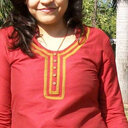The Ayurvedic medicines Haritaki, Amala and Bahira reduce cholesterol-induced atherosclerosis in rabbits.
Mots clés
Abstrait
Four groups of 25 rabbits each, were studied to determine the effect of Haritaki (Terminalia chebula), Amla (Emblica officinalis) and Bahira (Terminalia belerica) on cholesterol-induced hypercholesteolaemia and atherosclerosis. The control group was fed with cholesterol alone; the Haritaki group received Haritaki and cholesterol; the Bahira group received Bahira and cholesterol; and the Amla group received Amla and cholesterol for 16 weeks. Cholesterolaemia was significantly less (P less than 0.001) in the Haritaki group (166 mg/dl), the Bahira group (240 mg/dl) and the Amla group (205 mg/dl) than in the control group (630 mg/dl). The Haritaki group had significantly less cholesterolaemia (P less than 0.001) as compared to the Bahira and Amla groups. Aortic sudanophilia was significantly less (P less than 0.001) in the Haritaki group (6%), the Bahira group (16%), and the Amla group (12%) than in the control group (38%). The cholesterol contents of the liver and aorta, respectively, were significantly less in the Haritaki group (46 mg/100 g, 28 mg/100 g), the Bahira group (78 mg/100 g, 72 mg/100 g) and the Amla group (46 mg/100 g, 42 mg/100 g), than in the control group (604 mg/100 g, 116 mg/100 g). Among the drug-fed groups, the Haritaki group had significantly lower degrees of sudanophilia and cholesterol content of aorta and liver (P less than 0.001) as compared to the Bahira and Amla groups. Although all three drugs reduced serum cholesterol, aortic sudanophilia and cholesterol contents of liver and aorta, their effects were in ascending order of magnitude. The drugs did not influence serum triglyceride levels, euglobulin clot lysis time or platelet adhesiveness.(ABSTRACT TRUNCATED AT 250 WORDS)


